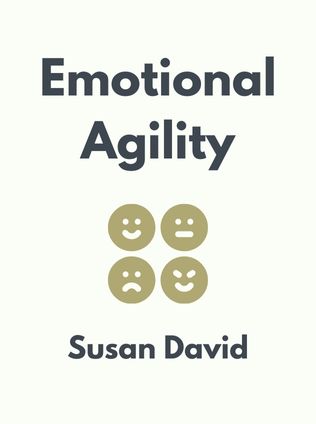
Emotional Agility
Get Unstuck, Embrace Change, and Thrive in Work and Life
By Susan David
Published 09/2016
About the Author
Susan David is a renowned clinical psychologist, management consultant, and coach who has worked extensively with leaders in both business and education. Her groundbreaking work in emotional intelligence has made her a prominent figure in the field of personal development. David’s expertise is rooted in decades of research and practice, focusing on how people can cultivate emotional agility to lead more fulfilling lives. She holds a PhD in psychology from the University of Melbourne and is on the faculty of Harvard Medical School. Emotional Agility is her flagship book, synthesizing years of study into a practical guide for anyone looking to improve their emotional resilience and live a life aligned with their values.
Main Idea
Emotional Agility introduces the concept of managing one’s emotions and thoughts in a way that enables thoughtful, value-driven actions rather than impulsive, emotion-driven reactions. David argues that many people are trapped by their emotional narratives—stories they create to make sense of their experiences—which often lead to behaviors that do not serve their true goals or values. By developing emotional agility, individuals can learn to observe their emotions with detachment, make conscious decisions, and live a more intentional and meaningful life.
Table of Contents
- Introduction: Understanding Emotional Agility
- The Controlling Power of Narratives
- Developing Emotional Agility
- Labeling and Accepting Your Emotions
- Viewing Your Emotions Objectively
- Choosing and Pursuing Your Values
- Living Your Life to the Fullest
- Overcoming Emotional Challenges
- Building Emotional Agility in Relationships
- Conclusion: The Path to Emotional Freedom
Introduction: Understanding Emotional Agility
In the introduction to Emotional Agility, Susan David presents the core concept of the book—emotional agility. She defines it as the ability to navigate life’s challenges by responding thoughtfully to emotions rather than reacting impulsively. David emphasizes that emotions are natural and valuable but should not control our decisions. Emotional agility, she explains, is about acknowledging and understanding your emotions, then making deliberate choices based on your values rather than being driven by immediate feelings. This approach, rooted in Acceptance and Commitment Therapy (ACT), encourages mindfulness and intentional living.
"Emotional agility is not about ignoring difficult emotions and thoughts; it's about holding them loosely, facing them courageously, and then moving past them to bring the best of yourself forward." - Susan David
The Controlling Power of Narratives
David explains that much of our emotional experience is shaped by the narratives we create—stories we tell ourselves to make sense of the world. These narratives often stem from past experiences and emotional reactions, which can distort reality and lead to unhelpful behaviors. For instance, a person who has faced rejection in the past may develop a narrative that they are unworthy of love, leading to avoidance of relationships and fear of vulnerability.
Narratives are powerful because they are reinforced by our emotions. When we internalize a negative narrative, we are more likely to experience emotions like fear, anxiety, or sadness, which further entrench the narrative. David argues that by recognizing these narratives and understanding the emotional patterns that underlie them, we can begin to challenge and change them, thereby freeing ourselves from their grip.
- A person who believes they are not good enough may avoid opportunities for growth, fearing failure and rejection. By challenging this narrative, they can start to see themselves as capable and worthy, opening the door to new possibilities.
- Someone who has been hurt in a past relationship might create a narrative that all relationships are destined to end in pain, leading them to avoid intimacy. Recognizing and addressing this narrative can help them form healthier, more fulfilling relationships.
"Our minds are constantly weaving narratives to make sense of the world, but these stories are not always true. We must learn to step back and question them." - Susan David
Sign up for FREE and get access to 1,400+ books summaries.
You May Also Like
The Subtle Art of Not Giving a F*ck
A Counterintuitive Approach to Living a Good Life
By Mark MansonRich Dad Poor Dad
What the Rich Teach Their Kids About Money - That the Poor and Middle Class Do Not!
By Robert T. KiyosakiHow To Win Friends and Influence People
The All-Time Classic Manual Of People Skills
By Dale CarnegieFreakonomics
A Rogue Economist Explores the Hidden Side of Everything
By Steven D. Levitt and Stephen J. Dubner



















